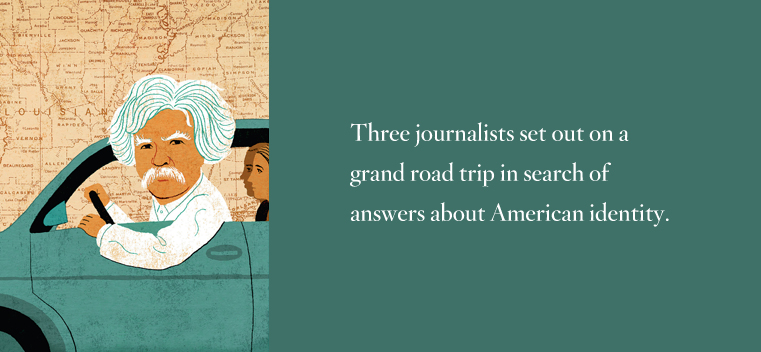
Following in the Footsteps of Twain
Find Us on Social Media
Three Northwestern adventurers discover America on the ultimate road trip.
This was rock bottom. Near the end of a three-month, Mark Twain–inspired road trip across America, professor Loren Ghiglione, Alyssa Karas (J11) and junior Dan Tham became victims of smash-and-grab thieves who broke into their Northwestern van in San Francisco. The bandits made off with luggage, as well as laptops and a video camera with irreplaceable stories, notes and footage. The travelers were devastated.
A day later, a mysterious tweet connected Karas with her red suitcase and the transgender porn star who had discovered it. Ironically, the only item missing was Karas’ biography of Twain. It turns out the iconic American author still has appeal and resonance.
During the fall, Ghiglione, former dean of the Medill School of Journalism, Media, Integrated Marketing Communications, Karas and Tham followed Twain’s path on a grand road trip in search of answers about American identity. Guided by Twain’s two U.S. travel books, Roughing It and Life on the Mississippi, as well as accounts of his travels to the Northeast for the Muscatine Journal, they traveled more than 14,000 miles and visited 28 states, heading first northeast to New York, then down the Mississippi River to New Orleans — their favorite city — and finally out West to San Francisco and Seattle. When possible, they stayed with friends, family and alumni from Northwestern and Haverford College, Ghiglione’s undergraduate alma mater.
Funded by donations from Howard S. Dubin (J54) and the Howard and Ursula Dubin Foundation and other alumni, the Twain travelers conducted 116 interviews, talking with everyday people about their lives. They examined issues of immigration, race and ethnicity and sexual orientation and posted stories and videos from their adventures on the Twain trip website.
Despite Twain’s being “a racist, nativist, anti-everything — Jew, Catholic, African American, Native American, Chinese, Irish,” Ghiglione has long admired him. “He grew in how he viewed the world, and part of that was through travel,” says Ghiglione, who plans to write a book on the Twain trip experience, perhaps with a documentary component. “It seemed to me we were making a point about growth just by taking the trip and listening to people.”
And many people they met talked about poverty. “It was in our face,” Ghiglione says. He heard it from Priscilla Cooper, a former welfare recipient in Cleveland who reported that her African American women friends who work in housekeeping have seen sharp reductions in pay — a development that she likened to a return of slavery. He heard it, too, from Ana Maria Hermosillo, whose husband worked at a Lexington, Neb., meatpacking plant. Ghiglione remarked to Hermosillo that meatpacking must be hard work. “And she said, ‘What’s hard work is when you’re picking in the fields.’ ”
The trio had fun on the journey, too. They celebrated Tham’s 21st birthday with carrot cake and a starry sky at a bed and breakfast in the former mining town of Unionville, Nev., where Twain once prospected. In New Orleans they prepared a meal from Twain’s days as a riverboat captain — boiled drum fish in a decadent cream sauce, cooked over a fireplace in a restored courtyard of an 1830s mansion.
In Tennessee the trio toured what once was the South’s largest tobacco plantation with a descendent of slaves from that estate. “That’s taking you to another world,” Ghiglione says. “The places that were most interesting were the ones where Northwestern faculty and students normally don’t go.”
The Twain trip team spent an emotional day at Angola, the Louisiana State Penitentiary known as the “Alcatraz of the South,” where they interviewed a half-dozen lifers and visited death row. “It’s a sobering place,” Ghiglione says. As large as Manhattan, Angola occupies 14 miles along the Mississippi River. “You see these inmates out there hoeing in the fields, maybe 150 of them walking in a line, and there’s a guard sitting on a horse with a rifle. It’s like a movie setting.”
It was an eye-opening sight for Karas. “I don’t know how you can ever be the same after seeing so much of your country, and a lot of it is stuff you don’t really want to see, like death row,” she says. “But you have to see it in the end, and you have to understand how we all fit into this country and how we have to work together to keep things going. If you don’t work at things, they fall apart. It’s important to collaborate and care about community, whether that’s on a small level or a national level.”



 Facebook
Facebook Twitter
Twitter Email
Email


